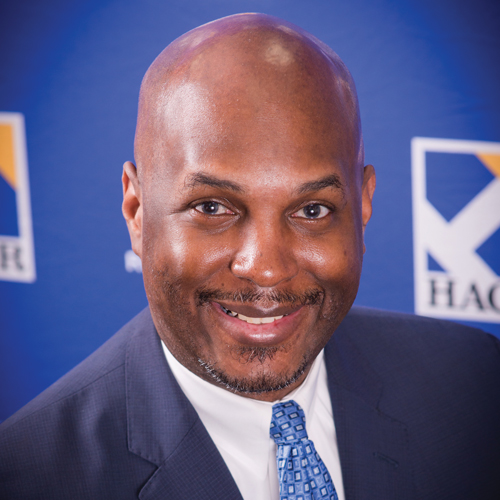 In June of 2014, the board of directors of ALPFA, Inc. one of the nation’s largest and most established Latino professional organizations, announced that CEO Manny Espinoza would be succeeded by Charles Garcia, a lawyer, business owner, Fortune 500 board member, decorated military officer, best-selling author, and presidential advisor. Garcia’s main objective is to advance ALPFA’s mission to develop leaders of character for the nation and create lifelong professional opportunities for its robust membership: 23,000 members within 42 professional and 128 student chapters across the nation. Hispanic Executive sat down with Charles Garcia and ALPFA national president and chairwoman Yvonne Garcia (no relation) to hear their plans for the future of the organization.
In June of 2014, the board of directors of ALPFA, Inc. one of the nation’s largest and most established Latino professional organizations, announced that CEO Manny Espinoza would be succeeded by Charles Garcia, a lawyer, business owner, Fortune 500 board member, decorated military officer, best-selling author, and presidential advisor. Garcia’s main objective is to advance ALPFA’s mission to develop leaders of character for the nation and create lifelong professional opportunities for its robust membership: 23,000 members within 42 professional and 128 student chapters across the nation. Hispanic Executive sat down with Charles Garcia and ALPFA national president and chairwoman Yvonne Garcia (no relation) to hear their plans for the future of the organization.
What are the most important ways in which ALPFA helps its members?
Yvonne Garcia: It provides the best peer-to-peer network, leadership development, high-level networking, and access to top leaders across sectors. In fact, I credit ALPFA for my becoming senior vice president of investment manager services at State Street Corporation. The organization holistically develops leaders capable of fulfilling top roles in top corporations, infusing its mission in all regional events and programs. Our annual ALPFA convention is a forum for students and professionals to bond with one another, network with corporate partners, express interest in recruitment, and attend leadership development workshops.
Talk about the career development aspect. Is ALPFA just for young professionals?
Charles Garcia: Not at all. We hope to capture [Latinos’] hearts and minds in high school, support their development throughout college, and then connect them to professional work they’re passionate about to then help them succeed throughout all stages of their career. We are working to strengthen the pipeline from the student level all the way to Fortune 500 boards. As the new CEO, one of my goals is to strengthen our programs for senior leaders. We often lose members after 8-10 years as they reach senior executive levels and rely more on their own company’s leadership development. But that is going to change.
Are your members’ needs changing? And if so, how do you plan to respond?
YG: I don’t think our members’ needs are changing, but the business world’s needs are. Technology not only changed the way we communicate and process data, it also drastically changed the speed at which we get things done. Our members strive to be leaders, and our organization is dynamic and responsive to position them. We are constantly improving our delivery and programs to meet both member and industry needs. With a new technology officer and Charlie’s leadership, we will be retooling our delivery model.
CG: In the last 20 years, two-thirds of nonfinancial S&P 500 companies have failed to survive. They were replaced with upstart rivals faster than anything capitalism has ever experienced. These fundamental changes can confuse professionals. For example, you once came to an office with a corporate hierarchy and worked to please your boss. Now big companies typically place employees into teams in which people often work remotely. You have to know how to interact on a team to be successful.
YG: Right. So, our members and leaders need to learn how to lead through influence versus authority. That lesson is the biggest gift ALPFA has given me.
What are the biggest challenges facing the Latino professional today?
CG: Professionals’ work lives are stressful, being bombarded with information 24/7 from multiple platforms. Balancing their work lives with their families and personal responsibilities—even managing their energy level—is extremely challenging.
YG: Yes, balancing work and family is tough. Everybody faces it, of course, but the Latino culture especially comes into play here. We are often responsible for caring for our elders. It’s not uncommon for a Latino professional to have a parent living in his/her household. Latinas have to balance their cultural instinct of always putting everyone else first. Twelve years ago, three ALPFA members took note of these issues and started our Women of ALPFA program. That’s how ALPFA responds to challenges with leadership.
What value does ALPFA bring outside the organization?
CG: I took this job because I believe that our country is at a key inflection point. We will have more than 10,000 older, mostly white baby boomers retiring every day for the next 18 years. They want to retire with their social security benefits, and that means we need young people to become workers and pay taxes into the system. One in four people under the age of 18 are Latino, and more than 1 million turn 18 every year. The workforce in some of our larger states is 40 percent Latino. Our country depends on this vibrant workforce for its future, and ALPFA’s mission is to empower and develop these Latino men and women into leaders of character for our nation in every sector of the American economy.
Charles, as the new CEO, what are your plans for the organization?
CG: Historically, Latino organizations haven’t been known to pack a punch the likes of the US Chamber of Commerce, AARP, AIPAC, or other large, powerful American nonprofits. We need to learn from them. There are more than 1.5 million non-profits registered in the United States, but only 150 of them have a budget greater than $50 million. I’d like ALPFA to be on that list. Finally, we intend to grow to more than 100,000 members in the next three years.
YG: We are blessed to share a very similar vision on where we see the organization going. Charlie is a proven leader who understands the impact our demographic is having in the United States and abroad but more importantly, how to position us to leverage that. We’re confident in his ability to resonate with our many chapter leaders around the nation and to lead us to the next level.
CG: We’ll also be making a big push to go after the entrepreneurial class. The strides in business ownership are particularly apparent among Latino women, who start businesses at a rate six times the national average. We need to support Latino entrepreneurs. Our competitive advantage is that we have professionals in ALPFA all across Fortune 1000 companies. These companies are not just looking for talent; they’re looking for diverse suppliers. We can help these Latino entrepreneurs grow by helping them win business.
How do you picture ALPFA in 20 years?
CG: Yvonne and I will be replaced with other leaders by then, but we hope that we will be able to closely coach those who will be our successors. I anticipate they will be better than us and will take us to new heights. ALPFA will be a recognized brand everywhere, and it will be one of the most powerful organizations in the United States and internationally. People will come to us for guidance, from business leaders to politicians. I expect to have more than a million members with very strong corporate partnerships. That’s where we’re going. We are creating a stronger America by empowering and developing leaders of character for our nation in every sector of the economy.
Editor’s Note: A previous version of this article in our print and online editions referred to ALPFA as the Association of Latino Professionals in Finance and Accounting. In 2010, the organization’s board of directors, endeavoring to expand its mission and inclusion, removed the acronym. Since then, the official name is ALPFA, Inc.

